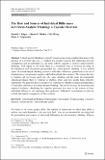| dc.contributor.author | Wang, Min | |
| dc.contributor.author | Bolger, Donald J. | |
| dc.contributor.author | Grigorenko, Elena L. | |
| dc.contributor.author | Mackey, Allyson | |
| dc.date.accessioned | 2016-12-28T16:23:25Z | |
| dc.date.available | 2016-12-28T16:23:25Z | |
| dc.date.issued | 2014-10 | |
| dc.identifier.issn | 1040-726X | |
| dc.identifier.issn | 1573-336X | |
| dc.identifier.uri | http://hdl.handle.net/1721.1/106160 | |
| dc.description.abstract | Critical-analytic thinking is typically conceived as a meta-construct that arises at the junction of a problem state (i.e., a situation that requires analysis that challenges previous assumptions) and an individual (i.e., an entity with the capacity to exercise critical-analytic thinking). With regard to the latter, there is a substantial body of research focusing on developmental and educational prerequisites for critical-analytic thinking. A less studied aspect of critical-analytic thinking pertains to individual differences, particularly in the set of foundational or componential cognitive skills that embody this construct. The bottom line here is whether, all else being equal (i.e., the same situation and the same developmental/educational stage), there is variation in whether, when, and how people think critically/analytically. We argue that there is unequivocal evidence for both the existence and importance of individual differences in critical-analytic thinking. This review focuses on theoretical and empirical evidence, identifying the cognitive processes that serve as the sources of these individual differences and capturing these processes’ differential contributions to both the critical and analytic components of this construct. | en_US |
| dc.description.sponsorship | National Institutes of Health (U.S.) (Grant HD079143) | en_US |
| dc.publisher | Springer US | en_US |
| dc.relation.isversionof | http://dx.doi.org/10.1007/s10648-014-9279-x | en_US |
| dc.rights | Article is made available in accordance with the publisher's policy and may be subject to US copyright law. Please refer to the publisher's site for terms of use. | en_US |
| dc.source | Springer US | en_US |
| dc.title | The Role and Sources of Individual Differences in Critical-Analytic Thinking: a Capsule Overview | en_US |
| dc.type | Article | en_US |
| dc.identifier.citation | Bolger, Donald J. et al. “The Role and Sources of Individual Differences in Critical-Analytic Thinking: A Capsule Overview.” Educational Psychology Review 26.4 (2014): 495–518. | en_US |
| dc.contributor.department | McGovern Institute for Brain Research at MIT | en_US |
| dc.contributor.mitauthor | Mackey, Allyson | |
| dc.relation.journal | Educational Psychology Review | en_US |
| dc.eprint.version | Author's final manuscript | en_US |
| dc.type.uri | http://purl.org/eprint/type/JournalArticle | en_US |
| eprint.status | http://purl.org/eprint/status/PeerReviewed | en_US |
| dc.date.updated | 2016-08-18T15:43:46Z | |
| dc.language.rfc3066 | en | |
| dc.rights.holder | Springer Science+Business Media New York | |
| dspace.orderedauthors | Bolger, Donald J.; Mackey, Allyson P.; Wang, Min; Grigorenko, Elena L. | en_US |
| dspace.embargo.terms | N | en |
| dc.identifier.orcid | https://orcid.org/0000-0003-2969-0028 | |
| mit.license | PUBLISHER_POLICY | en_US |
| mit.metadata.status | Complete | |
